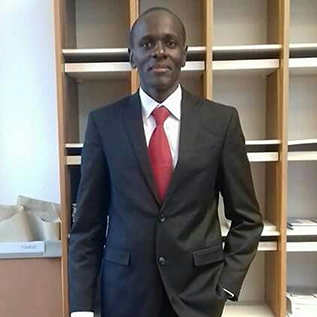SIT’s Steve Wandiga discusses the public health challenges and opportunities of COVID-19
June 25th, 2020 | SIT Graduate Institute, SIT Study Abroad

For Steve Wandiga, the coronavirus pandemic presents some fascinating opportunities.
As academic director of the SIT Study Abroad programs Kenya: Global Health and Human Rights and Public Health in the Tropics Internship, and co-chair of SIT Graduate Institute’s new MA in Global Health, Dr. Wandiga sees possibility where others might not.
Students and researchers are going to learn a lot about working remotely, international cooperation, and COVID's impact on public health in Kenya and Africa, he predicts.
"I'm optimistic," he says with a reassuring smile during a Zoom interview from Kisumu, Kenya, where he also serves as a senior research officer at Kenya Medical Research Center (KEMRI).
Although life in Kenya has been disrupted—schools and universities closed in mid-March—Dr. Wandiga is excited about SIT's upcoming five-week virtual summer internship program, which is online this year for the first time as a result of the global crisis.
When asked about what that will look like, Dr. Wandiga says it will be “intense.” The five-credit program includes: an internship seminar; lectures; weekly meetings with an internship advisor; weekly journaling; plenty of practical experience in public health; and a final presentation. The virtual internship will also be offered in the fall semester as a 12-week, 4-credit program.
Dr. Wandiga says SIT students will gain valuable experience engaging with Kenyan public health officials and practitioners while working with actual field data from a local teaching hospital or lab. At the end of the internship, he says, students will give presentations about their experiences.
It’s a meaningful opportunity even though students won't be able to take in the sights and sounds of Nairobi or Mombasa or visit nearby Uganda or Rwanda.
In addition to lectures and the seminar from local specialists, students will learn about more than the current COVID-19 crisis and the effects of the virus on Kenya's population of more than 47 million.
"A lot of attention is given to COVID, but there was life before COVID and life during COVID," says Dr. Wandiga, who is an expert in tuberculosis and HIV.
One impact of the pandemic, he says, is that people have been staying away from hospitals when they need treatment for other infectious diseases due to fear they'll contract the virus.
"TB services have gone down. HIV testing is down. Family planning is down," he notes. "Attention is given to COVID at the expense of other public health issues."
But he is also starting to see creative responses to deal with these concerns, like giving a patient HIV medication for two months when appropriate.
Dr. Wandiga says the program curriculum for SIT’s new Masters in Global Health has also been updated to include the COVID-19 crisis.
He adds: “The COVID-19 pandemic influences the delivery of SIT’s Global Health Master’s program simply because it is novel and no one has been in this kind of virulent environment before and running the program like COVID-19 did not happen would be a disservice to program students.”
Dr. Wandiga says this program is uniquely positioned because faculty are global health experts active in the field and share hands-on experience with students.
“We deliberately designed it this way so that theory and practice fused into one in the program,” he explains.
Projects, a practicum and a capstone are also distinguishing program features that bring together students and subject matter experts for conceptualization, implementation to analysis and writing.
The Master of Arts in Global Health Policy, Administration, and Management is open to students with public health degrees and other degrees with health-related backgrounds, as well as those with quantitative (statistics) and qualitative (social science or anthropology) degrees.
Dr. Wandiga, who holds a doctorate in medical research from Ludwig Maximilian University in Munich, Germany, believes researchers and graduate students will be studying health outcomes of this period for years to come, not least because goals like eliminating polio will need to be revisited all over again.
The weather in Kenya hasn't made things any easier in managing public health. There's been a lot of rain, causing flooding that leads to waterborne diseases like cholera, and forcing people out of their homes during the pandemic is hindering observation of regulations such as social and physical distance thus further propagating the crisis.
While some statisticians predict that the coronavirus will peak in Kenya in September, Dr. Wandiga expects it could spike sooner, in July or August.
"Not all is lost," says Dr. Wandiga, unexpectedly cheerful. "There are cross-country opportunities to learn from one another such as U.S. -Kenya: best practices, communication about the virus in Africa and North America, and a Madagascar drug treatment.” ("What, you don't know about it?" he asks incredulously, and like the passionate educator he instructs me to look it up when we finish talking, which I dutifully do. It's a drink dubbed "Covid Organics,” believed to be a treatment and cure for the virus.)
Comparison studies and exchange of information is a two-way street, Dr. Wandiga reminds me.
"All of this gives us an opportunity to come out of this better and stronger," he adds.
